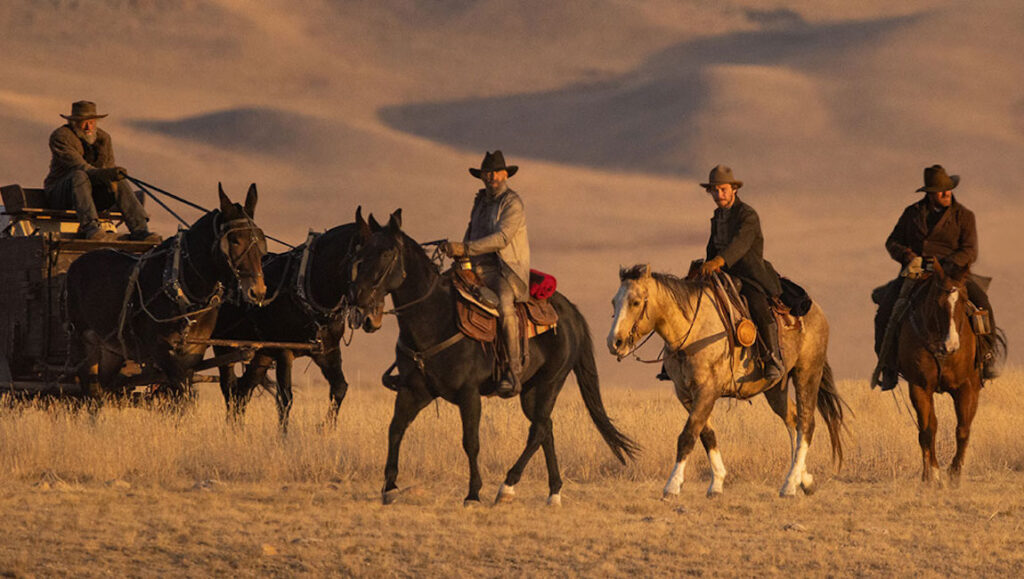Out of John Edward Williams’ three seminal novels — a trio of recently rediscovered bildungsromans about hapless young men who live uneventful lives (save for Gaius Octavius) filled with regret — Butcher’s Crossing, objectively the weakest of the bunch, was always going to be the easiest to adapt to the big screen. “Easiest” is the operative word here, as translating Williams’ prose without an easy-to-slip-into interiority was always going to be a bit of a challenge, the type that could potentially ruin the epistolary Augustus. There’s also the issue of how Williams paces his work: he’ll sometimes manipulate time by flying through several years in the span of a mere sentence, before then fixating on a few dragging seconds or some minute detail for over three pages. Stoner, an undeniable masterpiece of American fiction, would particularly be rendered as inert and a tad stogy when applied to the visual/audio-based medium known as cinema. Imagine having to re-establish, every few minutes or so, a new time leap within the same setting; the actor playing William Stoner would have to add on a few extra pounds of old man make-up as well, where the intended accumulative effect would never take hold.
Butcher’s Crossing, on the other hand, takes place over a relatively short period of time (three seasons, so not even an entire year) and isn’t as concerned with its central character’s sense of self — if anything, by the end of the novel, he finally grasps how frivolous his concerns are in comparison with the world around him. While it’s easy to retroactively label Butcher’s Crossing as one of the first major revisionist Westerns, a more contemporaneous comparison would be (and please stop me if this is getting too wild) Owen Klein’s Funny Pages: both are tangentially about inexperienced idiots from upper-middle class backgrounds who wish to cosplay as the working man, latching onto cursorily crazed figures who match up with their imagined ideals. That “hero” here (if you want to call him that) is Will Andrews, a third-year Harvard dropout who abandons his comfy East Coast upbringing and heads Westward in the hopes of finding something close to an authentic human experience — though, preferably in the most Emersonian vein as possible. He eventually teams up with Miller — a veteran trapper and a mythic, carnal-like figure throughout— his one-armed alcoholic side-kick Charley Hoge, and general asshole Fred Schneider, and together the four men embark on an expedition for a legendary buffalo herd that only Miller knows the way to, hidden away in a secret valley close to the Rocky Mountains.
It’s with this basic set-up — one that Williams leisurely moves along in the novel — where Gabe Polsky’s dry adaptation almost immediately falls apart. The setting of Butcher’s Crossing itself, which serves as a small microcosm for the outside world as a whole, has zero felt specificity — it looks, sounds, and feels like any other stock Western town, allowing viewers to disengage with the material before it even really begins to start. That slapdash feeling continues whenever any two characters are forced to speak with one another; since Polsky has no real feeling for this type of dialogue’s natural rhythm, he often forces his actors to barrel through conversations with little grace. Arguments erupt for seemingly no reason other than to instill a sense of the dramatic; again, there’s nothing about how the film operates in this section that suggests it needs to bear the namesake of an elegant piece of fiction. The actors themselves, while all serviceable in their respected roles, really aren’t bringing a lot to the table in terms of variation or liveliness; Fred Hechinger’s Will Andrews is never anything more than a series of wide-eyed stares and nervous twitches. A beautifully bald Nicolas Cage, who plays Miller, respectfully dials it back most of the time, choosing to let his anger boil into an even-headed simmer. This makes sense to a degree: Miller isn’t a loud tyrant, but an entitled, single-minded brat who will do just about anything to get his way, circumnavigating basic common sense in order to exude dominance over all. Here, at least how Cage plays him, he’s now just a super-serious dude who mumbles a lot.
Things don’t get a whole lot better as Butcher’s Crossing enters its second act: there’s a cheap, made-for-TV sheen to the film’s digital imagery — like we’re watching an episode of premium cable television — that looks phonier and phonier the heavier it relies on extreme-wide shots and sweeping camera movements to convey a false sense of scale to the journey. What should be a more pressing focus in the film is the physical toll taken, which Williams brutally details in the novel for countless pages on end. The beating heat produces chafing sweat that blisters and slowly erodes these men’s skin; that same visceral effect is hardly replicated by dumping a load of bad makeup onto an actor’s leg and having him go “ouch, my skin hurts!” really loudly. All hope nearly seems lost, until the film indulges in a brief hallucinatory freak-out sequence that includes a prostitute being fucked in the ass by a buffalo; it’s a truly go-for-broke bonkers few minutes, the only time the film ever feels like it’s coming alive or doing something fresh with the material. Unfortunately, things continue on, ending on the same ridiculous note and register that Williams ends his novel on (no spoilers, but even the original source material’s conclusion never felt remotely credible), and fails to even do that with a significant amount of flair. While doing the original Butcher’s Crossing justice would be difficult under most circumstances, the end results can be chalked up to the source material being simply too good, too graceful for talent this amateurish.
DIRECTOR: Gabe Polsky; CAST: Nicolas Cage, Rachel Keller, Jeremy Bobb; DISTRIBUTOR: Saban Films; IN THEATERS: October 26; RUNTIME: 1 hr. 45 min.
Published as part of TIFF 2022 — Dispatch 4.


Comments are closed.